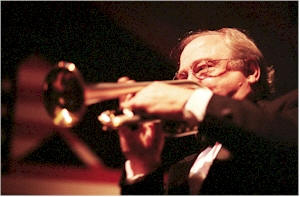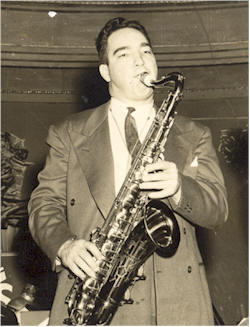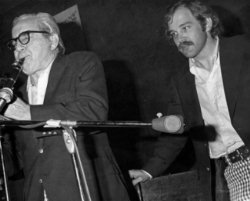Jim Cullum Jr. is the leader of the
Jim Cullum Jazz Band and proprietor
of the Landing Jazz Club on the
Riverwalk in downtown San Antonio.
Jim is also the co-producer of the
Riverwalk Jazz public radio
series.
Jim began playing cornet in 1955 at
age 14. Fascinated with the records
of legendary cornetist Bix
Beiderbecke, Jim was at first
self-taught. In high school he
organized his fellow musicians into
after-the-game dance bands. While
attending college, Jim began a
partnership with his clarinetist
father, the late Jim Cullum, Sr.,
forming a seven-piece traditional
group they called the Happy Jazz
Band.
Jim Sr. was born in Dallas and had
two careers—one in the family
grocery business and another as a
jazz reed player. During the 1930s
he worked in bands led by Jack
Teagarden, Jimmy Dorsey and Adrian
Rollini.
Part of my fascination with jazz
came from a desire to please and win
the respect of my father and mother.
This desire certainly lay beyond
consciousness, for when I began
discovering jazz I was a typical
early adolescent and would never
have voluntarily done what my
"prehistoric" parents wanted.
But I always admired them. They were
tangled up with jazz in a big way
and like any wild adventure, theirs
was a life of extremes. They had
lived the craziest, wackiest, most
romantic life and had the most
fun—at least so it seemed to me.
Ernest Hemingway had nothing on my
fun-loving father. But for a few
years beginning in about 1949, life
performed one of its inevitable
flip-flops and things weren't quite
as much fun anymore. Dad was 35 that
year.
Oh, he didn't give in easily. In
fact, even on an off day, he still
seemed to have a lot of fun. He had
a built-in ability to laugh at life.
An example: one day while we were
still living in Dallas, I went along
while Dad hung out at the "Pink
Elephant Lounge" with his drinking
buddy, drummer Bob McClendon. Still
young men, they were handsome and
well-dressed. They always reminded
me of a Hope and Crosby "Road"
movie. The Pink Elephant was aptly
named as it catered to hard-core
drinkers. In compliance with Texas
liquor laws of that time, The Pink
Elephant served only beer and
set-ups, but its owner ran a small
liquor store in the building next
door so customers bought distilled
spirits by the pint or fifth. The
Elephant action would start during
the late morning, about 11:00 AM,
with a few regulars struggling in
for "hair of the dog."
One day at the Pink Elephant, I was
on hand to witness Dad and McClendon
in a classic which started when Dad,
laughing and very much in the spirit
of the moment, dropped McClendon's
hat on the floor and stomped on it.
Wow! Take that! (He had been joking
about the style of the hat for
weeks.) With that, McClendon reached
over and picked up a large pair of
shears that happened to be lying on
the bar and cut off Dad's tie. To
make this more interesting, it was a
cold day and the heat wasn't on in
the Elephant. They stood in their
overcoats facing each other in a
Laurel and Hardy stance and
gradually tore and ripped off each
other's coats and shirts. One would
stand and look on as though
defenseless while the other seized a
piece of cloth like a suit breast
pocket. In a downward
thrust—rrrrrip—off would come the
pocket. It went on and on to the
astonishment of the bartender and
the other Pink Elephant customers.
Eventually we left for home, Dad
still laughing to himself. But the
other side of all this gradually
began to emerge. Dad and McClendon
were constantly playing practical
jokes on each other. The distributor
cap would be taken off the car or
the electric power or water would
get turned off. Twenty chicken
dinners were delivered. At this
stage my mother was worn out with
all this. She was the responsible
one—the balancer of books. Family
economics were already strained, and
Dad's fine Chesterfield overcoat,
his suit coat, shirt, and tie were
ruined. Although Dad laughed about
this for the rest of his life, that
afternoon, as reality set in, it
wasn't quite so funny.
Why such zaniness? Why such
destruction? The "jazz disease," Dad
called it. A little madness seemed
to go with the territory. Obsessed
with jazz, on fire with youthful
exuberance, possessors of inborn
musical talent, they were at the
same time frustrated eccentrics who
tended to have disrespect for the
bandleaders who employed them. Of
course, they wanted perfection both
in music and in the music business,
and they rarely got it.
One night, after a commercial gig he
could barely tolerate, Bob McClendon
quit the business and drove to the
middle of the Trinity River Viaduct
where he contemptuously threw the
drums he loved to play into the
Trinity and watched them float away.
Two weeks later, desperate to play,
he bought a funny-looking old set
that had been gathering dust around
the Musician's Union. The Union
secretary had brought them back from
France at the end of World War I.
McClendon paid him $5.00 for them,
took them away and made music on
them. Like any addict, he didn't
seem to especially like music while
he was playing but he couldn't live
without it. The jazz disease, no
doubt.
Too much drinking fit right in with
all of this. In fact, drinking and
driving were standard for those guys
in those years. Behind the wheel,
they would often take a slug and
follow with a quick 7-Up chaser. As
a boy, I rode in the back seat and
was known to drink up the chaser
when nobody was looking.
One day I was rolling along in the
back seat of the "Bronze Beauty"
(cornetist Garner Clark's very used
Packard was painted bronze). Dad was
driving, Garner rode in the front
seat. As we passed through a Dallas
neighborhood, we went by a house
with a young boy seated on its front
porch, playing a trumpet. Garner
blanched and commanded, "Stop the
car!" We backed up, and gradually
the house and young aspiring
trumpeter came back into view.
Garner got out, stood on the running
board, and called over the top of
the Bronze Beauty to the boy, "Don't
do it! Give it up, before it's too
late!" In my father's life, this
wild, heavy-drinking, jazz-crazy
chase was coming to an end. Like any
strong beast, all this didn't die
easily but struggled on and off
until March, 1953, when Dad took his
last drink and, at least for a
while, put his horn away.
We moved to San Antonio on my 12th
birthday. What a drag, man! I didn't
want to move to San Antonio. Leave
my friends? (I was 12 years old,
remember!). Oh, what a terrible
drag!
But for my parents, San Antonio was
the "promised land." A second chance
at life. Dad, now sober, had a
wonderful business opportunity, and
he meant to make the best of it. He
threw himself in with his amazing
energy, drive, and determination as
he made up for lost time. He used
his father and older brother Marvin
as his models and worked hard and
smart, and as he zoomed along he
built a big new business. The jazz
that had driven so much of his life
was gone. To everyone's surprise, I
began to become obsessed with jazz
just as Dad was putting it down.
We lived for a while in a modest
rent house, and Dad's collection of
78 RPM records, complete in its own
large stand-up chest, was placed in
my bedroom as the house offered no
other practical place for them.
So there I was, blue and lonely, 12
years old, nothing to console me
except those old scratchy records.
Gradually, they started coming to my
aid.
The rest of the family was too busy
to notice, but I escaped into Louis
Armstrong records. Putting hard
mileage on the already worn 78s, I
memorized Louis' solos and riffs.
Louis to the rescue. Bob Crosby was
well-represented in the records as
was the great Benny Goodman.
Eventually, I discovered Bix.
My musical beginnings were certainly
not normal. I wasn't in the Junior
High Band and I didn't have a
musical instrument of any kind. But
I was submerged in this old jazz and
was easily memorizing the work of
the great masters. I'd go around all
day whistling constantly to myself.
Bix and his Gang were my companions.
"Thou Swell," "Jazz Me Blues," "Ol'
Man River," "Royal Garden Blues."
I'd whistle the entire record:
intros, ensembles, interludes, and
solos.
One day I was absent-mindedly doing
my whistling thing when my melody
(or I should say, Bix's melody)
caught my father's ear. "Hey!" he
said, not realizing the source of my
song, "That's pretty good! Maybe you
should take up some kind of horn."
That was all I needed. It was just a
casual remark, and Dad wouldn't have
dreamed he'd just helped set me on
the jazz road. Oh, I thought, what
an idea—a horn!
I started thinking that maybe I
should get a trombone. It looked
easy to me: for a lower note just
shove the slide out a little more.
But I never got a chance to find out
about the trombone the hard way, as
fate had placed an interesting
antique cornet in my path. There it
was in a pawn shop window. I had
arrived there strictly by chance,
and spotted it from a restaurant
across the street. It drew me over
like a magnet. I could have sooner
ignored the Great Wall of China had
it suddenly appeared across the
street.
After several negotiating sessions
with the pawn broker, I became the
proud owner of a C. Bruno and Sons
Bb cornet; approximate date of
issue: 1905, price: $7.00. I bought
a book, How to Play the Cornet, for
$1.00.
So I was off. In one day I mastered
the C scale, and on day two I was
able to sort of render the song
"Ja-Da." In about two more days I
had ready the chorus of "Tin Roof
Blues."
My father began to occasionally
retrieve his clarinet from its
almost-forgotten, lonely residence
in the back bedroom closet. It had
been patiently waiting there, behind
out-of-date double-breasted dinner
jackets and two-toned shoes, for its
comeback. With a new and different
kind of musical spark Dad gave
practical suggestions and
experimented with different
harmonies to my crude attempts at
melody.
After about a year of progress, and
while attending Alamo Heights High,
I formed a "kid's band." Dad would
occasionally join us, playing a
borrowed tenor saxophone as the
clarinet chair was taken. Unlikely
opportunities for employment began
to come our way. We played some
afternoons at the Alamo Heights
Dairy Queen in return for a credit
line against which burgers, milk
shakes, sundaes, and other goodies
would be drawn. A few times we
played at school, in the halls or
after lunch and for assemblies.
Eventually we played for a few
dances around town, some even at the
San Antonio Country Club. At one
point during these High School
years, I decided it would be good
for me to join the Alamo Heights
High School Band, and I called the
band director, Mr. Arsers.
Enthusiastically, I described my
progress, showed off my old,
funny-looking cornet, and explained
my interest in advancing my skills,
learning to read music, etc.
Oh, was I disappointed! Mr. Arsers
emphatically refused to let me join,
citing a number of objections,
mainly that I hadn't come up through
the school district's music program.
Undaunted, I waited two weeks and
approached him again, but was
rebuffed this time on grounds that
my old cornet was silver-plated. The
Alamo Heights Band contained only
brass lacquered instruments!
Thus rejected, I went on to my next
period class, choral singing (all
along I was a member of the high
school chorus) and the choral
director, Mr. Greenlee, noticed my
distress. I told my story about not
being accepted by the band. "Why do
you want to be in the band anyway?"
he asked. "I'll teach you and in
return you can be my errand boy."
So it went. I ran errands for Mr.
Greenlee and he taught me, mostly on
piano, about music theory—chords and
scales and a lot of very useful
stuff I would never have gotten in
the band.
Fats Waller's words ring true: "One
never knows, do one?"
Epilogue
During the 1940s, there were some 50 members of the proud Dallas jazz elite. Being of the next generation, I watched them gradually fall away. The last to go was the remarkable Bob McClendon, who was going strong well into his 80s. Handsome and dapper to the last, he continued to drum around town. All during the 1980s, Bob played twice-weekly at the Greenville Bar & Grill in Dallas and never failed to ignite the band and the crowd. Booze never did get to him like it did some of the othersI enjoyed seeing him a number of times during his last four years. He had become a mellow reflection of the wild man he once had been. But he still had that laugh and spirit and would get that twinkle in his eye when he talked of the old days...like the time he was with Clyde McCoy's band and the musicians and band bus were assembled early one morning on the sidewalk just outside a hotel where they had worked and slept the night before. McClendon didn't show up at the pre-arranged time to load his drums on top of the bus.
Clyde, impatient and pacing up and
down the sidewalk, sent a band
member up to McClendon's room on the
6th floor with instructions to get
the drums down there at once.
You can easily guess the outcome.
McClendon was still asleep and sent
word back to McCoy to relax or he'd
place the drums "where the sun don't
shine!" (He never could stand
McCoy's corny trumpet playing
anyway.) Of course, McCoy hit the
ceiling and sent his messenger back
with word to get those drums down
there immediately or McClendon was
fired. With that, McClendon, true to
form, opened the window and heaved
the drums out. As they crashed to
the sidewalk six floors below and
just down from where the band was
waiting, they broke all to pieces.
McCoy, the musicians, the bus
driver, and a few passersby stood
open-mouthed as McClendon, laughing,
went back to bed and at least for a
while entered the ranks of the
unemployed. Crazy? No, the jazz
disease!;





